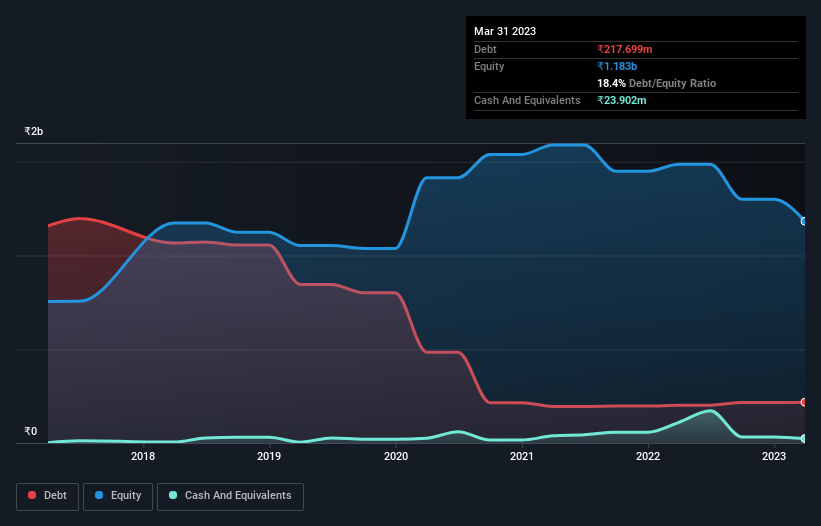
Some say volatility, rather than debt, is the best way to think about risk as an investor, but Warren Buffett famously said that 'Volatility is far from synonymous with risk.' So it might be obvious that you need to consider debt, when you think about how risky any given stock is, because too much debt can sink a company. We note that Lasa Supergenerics Limited (NSE:LASA) does have debt on its balance sheet. But the more important question is: how much risk is that debt creating?
When Is Debt Dangerous?
Debt assists a business until the business has trouble paying it off, either with new capital or with free cash flow. Ultimately, if the company can't fulfill its legal obligations to repay debt, shareholders could walk away with nothing. However, a more common (but still painful) scenario is that it has to raise new equity capital at a low price, thus permanently diluting shareholders. Having said that, the most common situation is where a company manages its debt reasonably well - and to its own advantage. The first step when considering a company's debt levels is to consider its cash and debt together.
View our latest analysis for Lasa Supergenerics
What Is Lasa Supergenerics's Net Debt?
As you can see below, at the end of March 2023, Lasa Supergenerics had ₹217.7m of debt, up from ₹201.7m a year ago. Click the image for more detail. However, because it has a cash reserve of ₹23.9m, its net debt is less, at about ₹193.8m.

How Healthy Is Lasa Supergenerics' Balance Sheet?
We can see from the most recent balance sheet that Lasa Supergenerics had liabilities of ₹427.3m falling due within a year, and liabilities of ₹28.4m due beyond that. Offsetting this, it had ₹23.9m in cash and ₹25.3m in receivables that were due within 12 months. So its liabilities outweigh the sum of its cash and (near-term) receivables by ₹406.5m.
Lasa Supergenerics has a market capitalization of ₹1.16b, so it could very likely raise cash to ameliorate its balance sheet, if the need arose. However, it is still worthwhile taking a close look at its ability to pay off debt. There's no doubt that we learn most about debt from the balance sheet. But it is Lasa Supergenerics's earnings that will influence how the balance sheet holds up in the future. So if you're keen to discover more about its earnings, it might be worth checking out this graph of its long term earnings trend.
In the last year Lasa Supergenerics had a loss before interest and tax, and actually shrunk its revenue by 5.5%, to ₹1.3b. That's not what we would hope to see.
Caveat Emptor
Importantly, Lasa Supergenerics had an earnings before interest and tax (EBIT) loss over the last year. Indeed, it lost a very considerable ₹200m at the EBIT level. Considering that alongside the liabilities mentioned above does not give us much confidence that company should be using so much debt. Quite frankly we think the balance sheet is far from match-fit, although it could be improved with time. Another cause for caution is that is bled ₹173m in negative free cash flow over the last twelve months. So suffice it to say we consider the stock very risky. The balance sheet is clearly the area to focus on when you are analysing debt. However, not all investment risk resides within the balance sheet - far from it. To that end, you should learn about the 6 warning signs we've spotted with Lasa Supergenerics (including 3 which are concerning) .
If you're interested in investing in businesses that can grow profits without the burden of debt, then check out this free list of growing businesses that have net cash on the balance sheet.
New: AI Stock Screener & Alerts
Our new AI Stock Screener scans the market every day to uncover opportunities.
• Dividend Powerhouses (3%+ Yield)
• Undervalued Small Caps with Insider Buying
• High growth Tech and AI Companies
Or build your own from over 50 metrics.
Have feedback on this article? Concerned about the content? Get in touch with us directly. Alternatively, email editorial-team (at) simplywallst.com.
This article by Simply Wall St is general in nature. We provide commentary based on historical data and analyst forecasts only using an unbiased methodology and our articles are not intended to be financial advice. It does not constitute a recommendation to buy or sell any stock, and does not take account of your objectives, or your financial situation. We aim to bring you long-term focused analysis driven by fundamental data. Note that our analysis may not factor in the latest price-sensitive company announcements or qualitative material. Simply Wall St has no position in any stocks mentioned.
About NSEI:LASA
Lasa Supergenerics
Engages in the research, manufacture, and marketing of animal and human healthcare products in India.
Excellent balance sheet low.
Market Insights
Community Narratives



